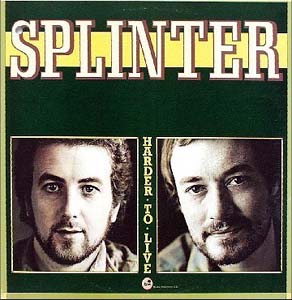
- Format: LP

SIDE 1:
1. Please Help Me [Purvis] (2:38)
lead vocal: Bob Purvis
harmony & backing vocals: Bill Elliott & Bob Purvis
drums and percussion: Earl Palmer
bass: Bill Dickinson
guitars: Chris Spedding
keyboards: John Taylor
horns, synthesizer, percussion: Tom Scott
percussion: Ralph McDonald
guitar: Robert "Waddy" Wachtel
string concertmaster: Bill Nuttycombe
2. Sixty Miles Too Far [Purvis] (4:05)
vocals: Bob Purvis & Bill Elliott
bass: Bill Dickinson
guitars: Chris Spedding
keyboards: John Taylor
horns, synthesizer, percussion: Tom Scott
percussion: Ralph McDonald
guitar: Robert "Waddy" Wachtel
string concertmaster: Bill Nuttycombe
3. Harder To Live [Purvis] (3:22)
vocals: Bill Elliott & Bob Purvis
drums and percussion: Earl Palmer
bass: Bill Dickinson
guitars: Chris Spedding
keyboards: John Taylor
horns, synthesizer, percussion: Tom Scott
percussion: Ralph McDonald
guitar: Robert "Waddy" Wachtel
string concertmaster: Bill Nuttycombe
4. Half Way There [Purvis] (2:58)
lead vocal: Bill Elliott
harmony & backing vocals: Bill Elliott & Bob Purvis
drums and percussion: Earl Palmer
bass: Bill Dickinson
guitars: Chris Spedding
keyboards: John Taylor
horns, synthesizer, percussion: Tom Scott
percussion: Ralph McDonald
guitar: Robert "Waddy" Wachtel
string concertmaster: Bill Nuttycombe
5. Which Way Will I Get Home [Purvis] (3:56)
lead vocal: Bill Elliott
harmony & backing vocals: Bill Elliott & Bob Purvis
drums and percussion: Earl Palmer
bass: Bill Dickinson
guitars: Chris Spedding
keyboards: John Taylor
horns, synthesizer, percussion: Tom Scott
percussion: Ralph McDonald
guitar: Robert "Waddy" Wachtel
string concertmaster: Bill Nuttycombe
SIDE 2:
1. Berkley House Hotel [Purvis] (3:22)
lead vocal: Bill Elliott
harmony & backing vocals: Bill Elliott & Bob Purvis
drums and percussion: Earl Palmer
bass: Bill Dickinson
guitars: Chris Spedding
keyboards: John Taylor
horns, synthesizer, percussion: Tom Scott
percussion: Ralph McDonald
guitar: Robert "Waddy" Wachtel
string concertmaster: Bill Nuttycombe
2. After Five Years [Purvis] (3:07)
vocals: Bill Elliott & Bob Purvis
drums and percussion: Earl Palmer
bass: Bill Dickinson
guitars: Chris Spedding
keyboards: John Taylor
horns, synthesizer, percussion: Tom Scott
percussion: Ralph McDonald
guitar: Robert "Waddy" Wachtel
string concertmaster: Bill Nuttycombe
3. Green Line Bus [Purvis] (4:01)
lead vocal: Bill Elliott
harmony & backing vocals: Bill Elliott & Bob Purvis
drums and percussion: Earl Palmer
bass: Bill Dickinson
guitars: Chris Spedding
keyboards: John Taylor
horns, synthesizer, percussion: Tom Scott
percussion: Ralph McDonald
guitar: Robert "Waddy" Wachtel
string concertmaster: Bill Nuttycombe
4. Lonely Man [from the film "Little Malcolm And His Struggle Against The Eunuchs"] [Purvis & Evans] (5:30)
vocals: Bob Purvis & Bill Elliott
organ: Billy Preston
guitar: George Harrison
drums: Jim Keltner
bass: Bill Dickinson
Fender Rhodes: John Taylor
Co-produced by George Harrison & Tom Scott
5. What Is It (If You Never Ever Tried It Yourself)? [Purvis & Elliott] (3:43)
vocals: Bill Elliott & Bob Purvis
drums and percussion: Earl Palmer
bass: Bill Dickinson
keyboards: John Taylor
horns, synthesizer, steel drums, percussion: Tom Scott
percussion: Ralph McDonald
guitar: Robert "Waddy" Wachtel
string concertmaster: Bill Nuttycombe
On "Harder To Live", Splinter's sophomore album, Harrison only participated on one track: "Lonely Man" was co-produced by Harrison and Tom Scott, and "Hari Georgeson" played guitar. It's a transcendent ballad with impressive vocals. It was used in the 1974 movie Little Malcolm And His Struggle Against The Eunuchs, which was Harrison's first foray into film production. It's the only song on "Harder To Live" that measures up to the promise of "The Place I Love".
The rest of the album is given comparatively thin production by Scott, who also played several instruments. Without Harrison's intervention, Splinter turned out to be good instead of great. Most of the songs resemble a folkier version of Badfinger. The songs are not quite as downbeat as the album's title suggests; the title track is a bouncy tune about the high monetary cost of living. Another set of impressive musicians provide backing (i.e. Chris Spedding, Waddy Wachtel, John Taylor), but they are not in the same class as the first album's ensemble. "Harder To Live" is no dud, but it lacks the splendor of its predecessor. The second side is the better one.
Splinter's second release on Dark Horse had a lot less involvement from George Harrison, which is felt throughout the album. This means that the album is not as strong as their debut (1974's The Place I Love), but it is still a very good album. Splinter is comprised of Bill Elliot and Bobby Purvis, both vocalists, who create a beautiful harmony together. They also managed to form a tight, talented, and famous backup band, arranged by the ever-talented Tom Scott (who also contributes musically). Included in the band is Chris Spedding providing strong guitar, and Harrison, who contributes production and guitar (under the name Hari Georgeson) to the wonderful and moving "Lonely Man," which was also the theme to Harrison's first venture into film producing, Little Malcom and His Struggle Against the Eunuchs. It is also co-written by Mal Evans and is by far the strongest track on the album. Other highlights include the beautiful "Green Line Bus" and "Berkley House Hotel," which harkens back to the folk sound of their debut. The music on the album drifts between easy listening pop/rock to folk, but never focuses on one distinct sound. This makes for an uneven listening experience, but the highlights far outweigh the low points.